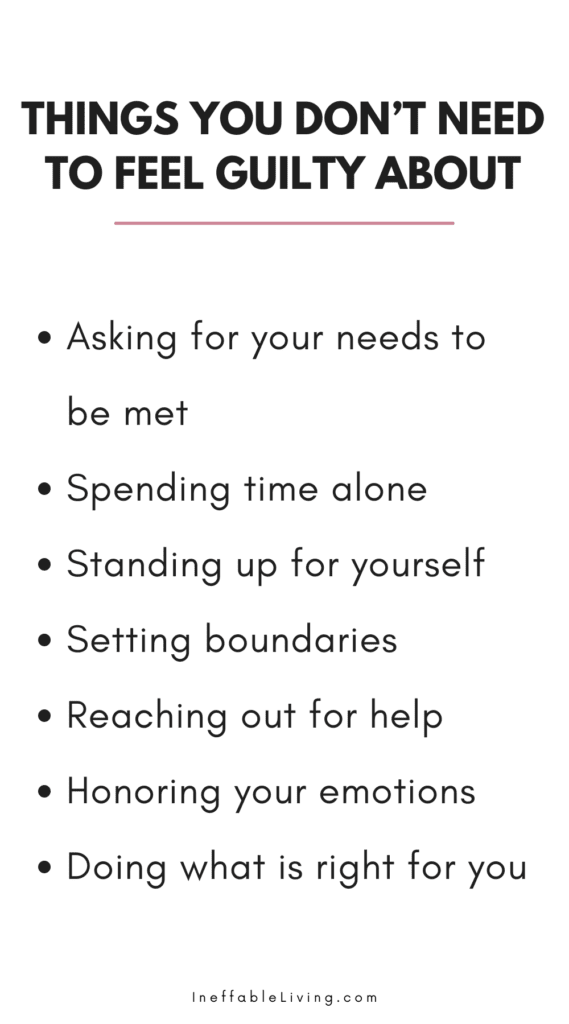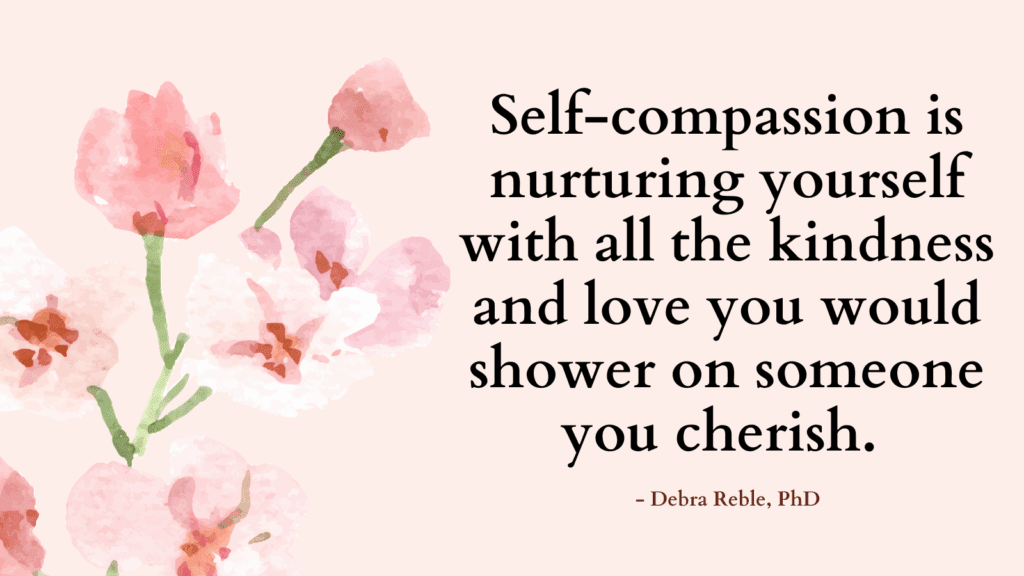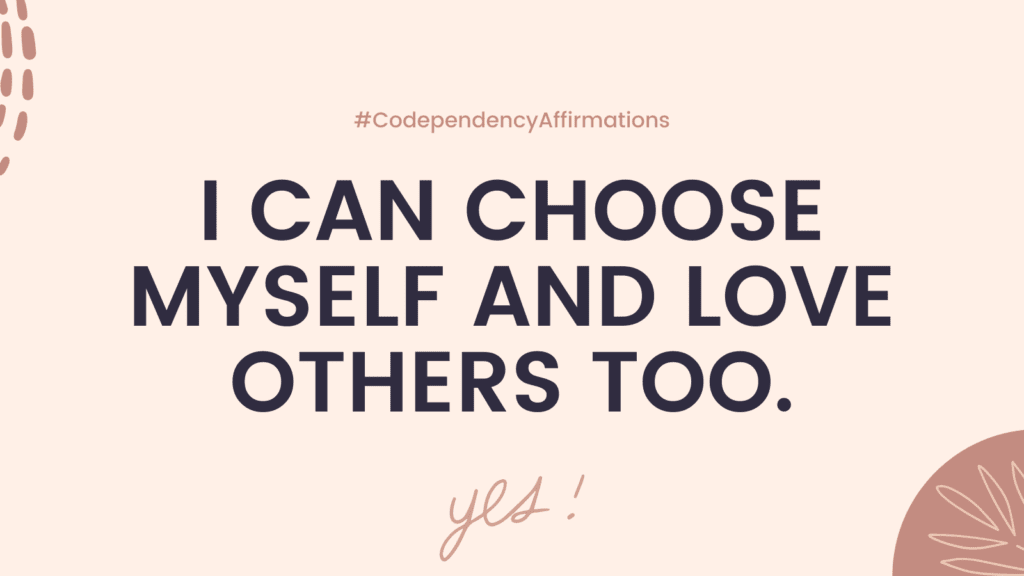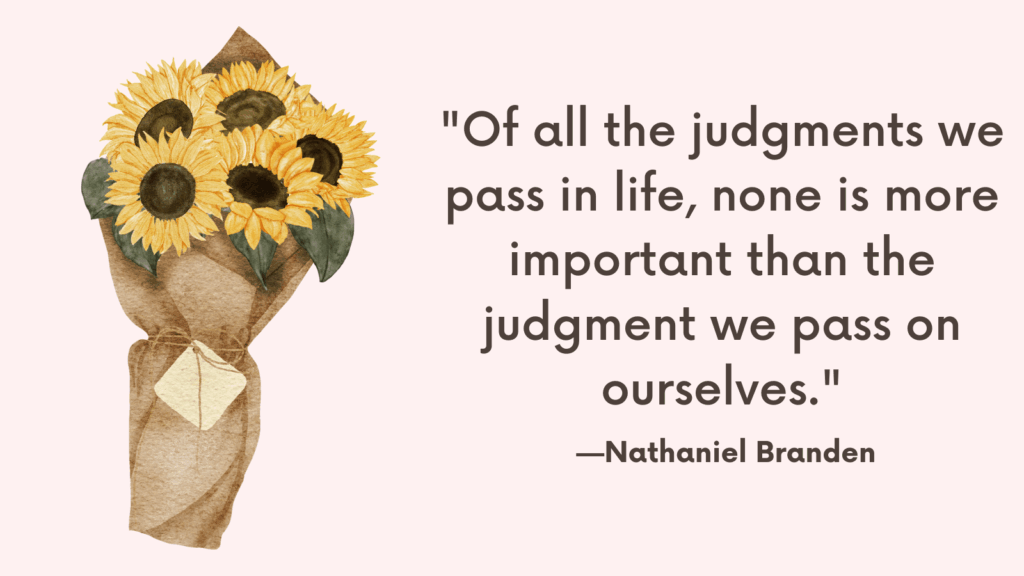This post contains helpsful tips to help you overcome high functioning codependency.
What Is High Functioning Codependency?
Codependency is a disease of lack of sense of self.
The codependent is overly focused on others and completely out of touch with themselves, including their own feelings, thoughts, needs, desires, etc.
Common issues codependents struggle with include: people-pleasing, perfectionism, feelings of shame, anxiety, depression, lack of boundaries, unhealthy relationship patterns, etc.
For high functioning codependents these issues can go undetected, yet cause great damage to every area of their lives.
Learn more about high-functioning depression here.
What Codependency Is Not
Some people are labeled “codependent” simply because they are taking care of a sick relative or helping someone.
Codependency is about the act of taking care of someone. It’s about the motive behind the act.
Is Codependency a Disease?
That codependency is a disease that was first suggested in 1988 by psychiatrist Timmen Cermak.
Although Disease may sound morbid, codependency is only a condition with progressive symptoms that impair normal functioning.
Alcoholism was termed a disease in 1991 by the American Medical Association (AMA) along with drug dependencies.
Since then, experts have applied the medical model of disease to sex, food, and gambling addictions, and also codependency.
The Spectrum of Codependency
The severity of codependency symptoms varies depending on a number of factors, such as:
- Being under stress
- Being in a unhealthy relationship
- Past traumas
- Your family dynamics
- Your addictions
Whether or not you identify as codependent, recovery can still help you alleviate any symptoms of codependency you recognize.
Recovery can help you feel good about yourself, live more authentically and enjoy intimate relationships.
Related: What Is Trauma Bonding? 10 Signs of Trauma Bonding
How Do I Know If I Am Codpendent? 14 Symptoms of High-Functioning Codependency
1. Hidden Shame
Shame is a healthy emotion when it prevents you from doing something that’s considered socially unacceptable, like attacking or insulting someone.
However, shame becomes toxic when you internalize it and turn it into a belief about yourself. Rather than thinking, “I made a mistake,” you may find yourself thinking, “I am a mistake.”
Toxic shame is a painful feeling of unworthiness and inadequacy.
For most codependents, shame is internalized from childhood experiences and persists longer after the initial trigger.
Like an open wound that has never healed, toxic shame makes ordinary shame last longer and feel more intense.
Shame can cause low self-esteem and other codependent symptoms, such as people-pleasing, control, caretaking, depression, intimacy problems, lack of boundaries and assertiveness, and perfectionism.
Internalized shame also creates a sense of inferiority. You may compare yourself negatively to people and believe that you’re never enough: that you’re not doing enough, good enough, attractive enough, smart enough, etc.
Related: 10 Signs of Toxic Shame — and How to Overcome Toxic Shame?
2. Low Self-Esteem
Self‐esteem reflects how you think about yourself.
Although self-esteem is a self-appraisal that is not based on what others think, codependents look to others for validation. Other people make them feel good or bad.
People with high self-esteem feel bad when they have a difficult day or become ill, but this feeling is fleeting and doesn’t reflect their self-esteem. They know they have the resources to recover.
Related: Raising low self-esteem: 18 Ways to Build High Self-Esteem
3. People-Pleasing
There are codependents who would bend over backwards to accommodate others. They desperately want others to validate them, like them, or at least need them.
As a result, they priorities other people’s needs and feelings and may even become what they believe is expected or desired by someone else.
The more the codependent looks outward to define how they should feel, think, and behave, the more disconnected and estranged they feel from their inner self.
Related: How to Overcome People Pleasing for Good?
4. Guilt and Apologizing
We feel guilty when we think we’ve said or done something that violates an ethical principle or hurts someone else.
Codependents blame themselves often for things that are out of their control, such as other people’s feelings and behaviors.
Guilt could get compounded by feelings of shame. You may find yourself thinking, “I shouldn’t have done that,” followed by shame, “I’m selfish.”
5. Pursuit of Perfection
Self-comparison to ideal standards can cause ongoing self-judgment. This makes a perfectionist in a constant pursuit of illusory standards that are always out of reach.
Perfectionism is unhealthy because it’s usually driven by internalized shame that the person is flawed.
Related: Covert Perfectionism: 10 Ways to Overcome Covert Perfectionism
6. Unhealthy Emotional Boundaries
Boundaries define where you end and others begin. They protect you from others and prevent you from violating others’ boundaries.
If boundary setting wasn’t modeled to you growing up or your needs and feelings weren’t respected, you may find it difficult to recognize when others invade your personal space and vice versa.
Setting healthy boundaries starts with self-awareness. As you get in touch with your feelings and needs, you’ll be able to define where you need boundaries.
When your boundaries are weak, you may allow others to blame, control, abuse, or take advantage of you. You may feel responsible and even guilty for someone else’s problems and feelings.
If your boundaries are rigid, you may isolate yourself and struggle with emotional intimacy.
Related: How to Firmly Establish and Enforce Healthy Emotional Boundaries?
7. Depending on Others
Codependents are by definition “dependent.” Their dependency comes from low self‐esteem and fear of abandonment.
Codependents can become so invested in others that they lose who they are – their feelings, needs, interest, dreams, etc.
Their thinking and actions would revolve around worrying about, changing, and reacting to someone else.
Signs of dependency may include:
- Difficulty making decision on your own
- Valuing other people’s opinion over your own
- Feeling disconnected from yourself
- Fear of being alone
- Excessive thinking or talking about someone
- Giving up your plans and interests to be with someone
- Adapting to other people’s opinions and interests
8. External locus of control
In his book Psychology and Life, psychologist Philip Zimbardo explains that “A locus of control orientation is a belief about whether the outcomes of our actions are contingent on what we do (internal control orientation) or on events outside our personal control (external control orientation).”
People with an internal locus of control are more likely to take responsibility for their lives, create their own happiness, and tend to be less influenced by other people’s opinions.
Codependents have an external locus of control. They usually blame outside forces for their circumstances and don’t believe that they can change their situation through their own efforts. This causes them to experience learned helplessness.
This learned helplessness leads codependents to stop trying and overlook any opportunity for change and relief.
Related: Get Out of Your Own Pity Party: How to Stop Pitying Yourself?
9. Lack of Assertiveness
Healthy communication is clear, honest, and direct. Codependents have poor communication skills. They usually struggle to express their feelings and needs. This is mainly because:
- They fear criticism and rejection
- They avoid conflict
- They don’t want to be a burden or sound “selfish”
- They fear making a mistake
- They worry they might hurt someone else’s feelings

10. Reacting
Codependents are other-defined. Their actions and moods are predominantly determined by outside influences.
A simple text message can ruin their mood and how they think of themselves.
Related: How to Communicate More Effective in Relationships (Effective Communication)
11. Savior Complex: Control and Caretaking
While it’s normal to need control and predictability, it becomes problematic when you try to control what’s out of control.
Codependents engage in covert or indirect control. This may include:
- Caretaking
- Pleasing
- Gifts and favors
- Withholding
- Helplessness or passivity
12. Denial
Denial refers to the inability to acknowledge the truth of something. It is considered the hallmark of addiction, but it also applies to codependents’ addiction to others.
Codependents typically blame others without looking at their own issues.
Codependents are also unaware of their feelings and needs.

13. Painful Emotions
Painful emotions codependents experience may include, anxiety, shame, resentment, fear, anger, hopelessness, and even depression.
Related: Regulate Your Emotions: How To Manage and Control Your Difficult Emotions?
14. Physical Symptoms
Stress caused by codependent relationships can affect physical health and wear down the body’s immune and nervous systems.
Health problems may include, heart disease, digestive issues, sleep disorders, headaches, muscle tension and pain, obesity, ulcers, and chronic fatigue syndrome.
Can You Be Both Codependent And Counterdependent?
Counterdependency is the state of detachment and the denial of personal need and dependency.
A person may be codependent in their personal relationships but Counterdependent at work, or the opposite.
Can You Heal From Codependency?
Although the broken relationship guide received from their parents may seem permanent, as humans, we have remarkable transformative potential.
We are capable of healing and rising above the seemingly indisputable impact of our childhood.
Psychotherapy, 12-step recovery program, and a change of lifestyle can make it possible for the codependent to build (repair) their tattered self-esteem and begin to enjoy love, reciprocity, and mutuality.
Get FREE Overcome Codependency Worksheets
How To Overcome High Functioning Codependency?
#1. Connect With Yourself
Before connecting with others, you must first connect with yourself.
Connecting with yourself is about becoming someone who is centered and less likely to be distracted easily by what’s happening around him.
Spending time with yourself doesn’t mean doing an activity alone like reading or watching TV. It means focusing on what’s going on inside, getting to know yourself, and discovering rich and nourishing inner resources.
Some of the best techniques that will help you connect with yourself are meditation, spending time alone, and journaling.
1. Practice Meditation
Meditation helps you find balance and inner peace. It’s especially helpful to manage your day-to-day stress. It helps you control your mind and emotions.
2. Spend Time With Yourself
Spending a few minutes every day in your own company, is another way to connect with yourself.
Getting to know someone requires time together.
You have to commit to spending more time alone to become friends with yourself so that later when you’re around others you can check in with yourself and not get lost in someone else.
This could be part of your meditation sessions, or it could be done as part of your self-care routine.
3. Daily journaling
Writing your feelings and thoughts in a journal helps you connect with your inner self.
You can also use prompts to help you begin like:
- “Right now I’m feeling . . . because . . .”
- “If I could talk to my younger self, I would say …”
- “For me self-love means…”
- “Things I can do to help my mental health are…”
- “What do I like most (and least) about myself?”
- “What excites me the most?”
- “What nourishes me most?”
- “What was my most painful experience? Did I learn from it?”
- “What was the biggest challenge I overcame? What did I learn?”
#2. Build Your Emotional Vocabulary
Your feelings are part of your internal feedback system. They’re your compass in life so it’s important to pay attention and listen to them.
Emotional intelligence includes being aware of your emotions, feeling, naming, and expressing them.
Anxiety, guilt, and worry are milder forms of fear. Jealousy can be a combination of anger and fear.
Read: Best 20 Must-Read Books On Codependency
#3. Change Your Limiting Beliefs
In order to create lasting change, you need to change your beliefs, not just your environment or your behavior.
You can move to another city, delay replying to texts so you won’t appear too desperate, but you don’t change your beliefs, any change you make won’t be sustainable.
When you shift your beliefs, an automatic ripple effect to the outer aspects of behavior and environment is created.
You might not notice the results in a week or a month, but consistent practice over time will lead to significant transformation.
1. Becomes Aware of Your Negative Beliefs
The following is a list of negative beliefs you may have:
- “I have no value on my own therefore I shouldn’t exist for myself.”
- “My value comes from the people who agree to stay by my side in exchange for my dedication to them.”
- “I must be constantly present in the lives of the people who are important to me in order to ensure prominent place in their lives.”
- “The only thing that matters is having people’s affection and acceptance, in exchange I’m willing to give my love and help without any reservations if required.”
- “I have to fill you with love, if I don’t, you will abandon me.”
If you find it hard to convince yourself that these are negative beliefs, consider the people that left you because they perceived your love as dense and complicated and the times you felt betrayed by people whom you considered ungrateful.

2. Create Positive Beliefs to Replace Your Old Ones
The best way to change your beliefs is to create affirmations that, when repeated day in and day out, will replace your old beliefs.
Examples of these affirmations:
I’m worthy and lovable the way I am.
I’m good enough.
I prioritize my own needs first.
3. Positive Affirmations Alone Aren’t Enough
Change happens when thoughts and behavior are in alignment.
It’s not enough to affirm to yourself that you’re worthy, you need to treat yourself as if you’re worthy. You need to start taking care of yourself and prioritizing your own needs.
You change by turning your belief into experience.
Related: 10 Powerful Techniques To Control Your Negative Thoughts
#4. Address Feelings of Shame
Shame exists on a spectrum, with healthy shame at one end and toxic shame at the other.
Healthy shame is saying, “I did something bad.” Toxic shame, on the other hand, is saying, “I am bad.”
Toxic shame can be physically paralyzing and mentally lethal.
The best way to deal with feelings of shame is to have compassion for yourself instead of self-punishing, and to allow yourself to be vulnerable with a safe person.
How to be compassionate towards yourself?
Treat yourself as you would treat a dear friend.
When you catch yourself judging and criticizing yourself, acknowledge that this is your inner self-critic at play, and challenge that voice with more compassionate self-talk.
When you first practice self-compassion, it might feel unnatural. It’s unlikely to generate feelings of warmth, but that’s a sign that you need more practice.
Sharing your difficult feelings with a safe person and experiencing empathy help reduce feelings of shame.
Related: 10 Signs You Were Shamed In Childhood

#5. Practice Self-love
Loving is a combination of an attitude of acceptance and compassion and acting lovingly toward yourself.
Many people share the misconception that self-love is egotism or narcissism, but narcissists actually loathe themselves. Their ego is compensation for a lack of self-love.
Nor does self-love take away from your ability to love others. In fact, the more you love yourself, the more able you are to love others and allow yourself to receive their love.
Notice when you’re having negative thoughts about yourself and try to treat yourself with compassion.
Notice when you’re stressed, overwhelmed, or exhausted and find ways to care for yourself.
Practicing a self-care activity for 10 minutes a day is a good start.
Related: Love Yourself: What Is Self-Love & How to Start Loving Yourself?
#6. Express and Assert Yourself
Once you identified your feelings, values, and needs, the next step is to express and assert yourself.
Assertive communication is about clearly and politely stating what you think, feel, need, or want. You can also explain why.
Assertive communication is respectful, direct, and nondefensive.
Communicating feelings
Many people confuse thoughts and feelings in speaking.
For example, when a friend is late to a meeting, telling him, “I feel you were inconsiderate” is not an expression of your feelings. It judges his behavior without telling him how his behavior affected you.
The rule is: if you can substitute the word “feel” for “think,” then you’ve expressed a thought, which is often a judgment about the other person.
Instead, try saying, “I felt hurt (or “disregarded”) when you didn’t show up on time.”
The more vulnerable you are in expressing your feelings, the more receptive your listener will be.
Communicating needs
Communicating your needs can be frightening, especially when you’re not used to it.
Many codependents believe that should be able to instinctively know and anticipate their needs, and if they ask for it, they may devalue it, saying, “It doesn’t count because I had to tell you.”
Start practicing asserting your needs, by saying something like, “It’s important to me that you __,” or, “I’d really appreciate it if you __.”
You may also let the person know the positive effect of meeting your need, “If you __, it would make me feel closer to you.”
Related: How to Be More Effective in Relationships (Effective Communication)
Resources
- The Lived Experience of Codependency: an Interpretative Phenomenological Analysis | SpringerLink
- Codependency: An Empirical Study from a Systemic Perspective | SpringerLink
- Living with Addicted Men and Codependency: The Moderating Effect of Personality Traits – PMC (nih.gov)
- Measuring codependents’ close relationships: a preliminary study – PubMed (nih.gov)
- Co-Dependency | Mental Health America (mhanational.org)
- Codependency: What Are The Signs & How To Overcome It (positivepsychology.com)
- Codependent relationships: Symptoms, warning signs, and behavior (medicalnewstoday.com)
- Codependency of the Members of a Family of an Alcohol Addict – ScienceDirect





